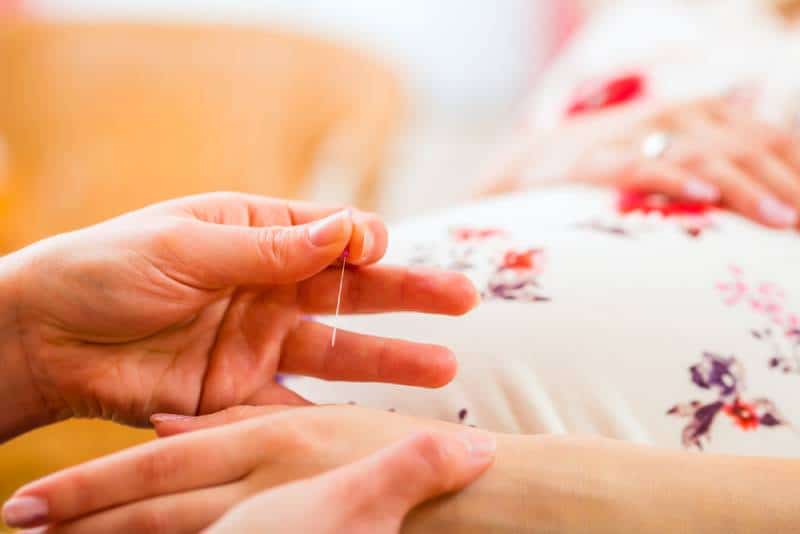In these modern times, many expecting women tend to reach out to alternative forms of medicine for various reasons and one of the more popular ones is acupuncture in pregnancy.
The benefits of acupuncture in pregnancy are plentiful, with some of the most useful being an increased chance of conceiving a child to simple pain relief due to the activation of various acupuncture points along the body.
Why go this route at all, you may ask? Well, it’s because during pregnancy (especially the first trimester) and a good while after delivery, many painkillers and other medications aren’t recommended due to the potential harm it may cause the baby.
So, what else are pregnant women to do but try and find an alternative, one that may have more merit to it that you may yet think.
And the goal is a bit similar for women who are hoping to conceive – they’re simply trying to find any means necessary to boost their odds.
And, chances are that it’ll help with many issues in pregnancy, even if it’s just a placebo effect.
So, before we see what exact pros and cons acupuncture during pregnancy can bring to the table, let’s find out what acupuncture actually is.
What Is Acupuncture?
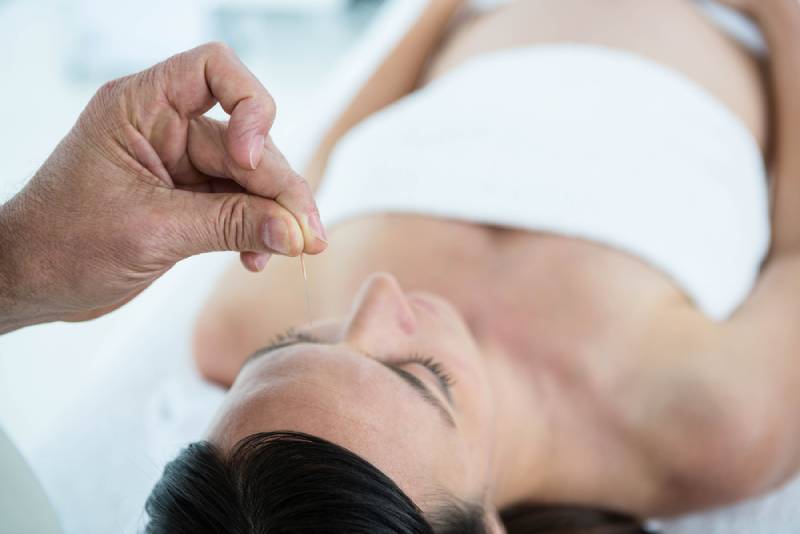
I’m certain that many of you are familiar with the branch of Oriental medicine known as acupuncture.
An acupuncture treatment is done by activating various acupressure points on the body through a series of thin, sterile needles.
Think of it as a jump-start to the body’s various dormant abilities that we ourselves cannot consciously control.
While there are various acupressure points that correspond to an individual purpose, they generally boil down to a few groups that help out with triggering our body’s regenerative abilities – specific points that help relieve physical and mental stress or even help out with some body complexes that may have developed inexplicably.
And no, it’s not magic, as much as it was believed as such back in ancient China where it was first conceived.
It’s a form of alternative medicine that uses nerve stimulation through these needles to help with the release of hormones to achieve the effects some modern drugs may have (nothing too major though).
And, contrary to popular belief and the fear of many people who dislike the sight of a needle, the process itself doesn’t even hurt.
You can barely even feel the needles going in, as they’re way thinner than a syringe needle (since there’s no need for fluid exchange).
Just make sure you’re going to a certified acupuncturist before trying out this unique form of traditional Chinese medicine practice.
The last thing you want is someone who is just poking your body randomly or, in the worst case scenario, someone who isn’t using sterilized needles because that’s only going to cause an infection or something worse.
The Most Common Uses For Acupuncture
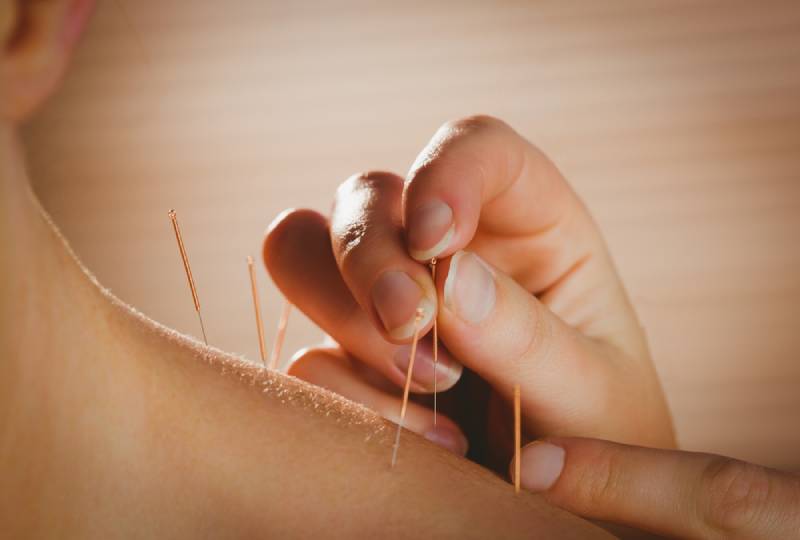
In general practice, the main use of acupuncture is for relieving different sorts of pain or to help patients deal with some specific treatments.
The most common uses of specific acupuncture are:
- Relieving various headaches
- Alleviating low back pain
- Alleviating neck pain
- Alleviating pelvic pain
- Helping deal with menstrual cramps
- Dealing with nausea and vomiting (no matter the cause)
- And, most recently, helping relieve labor pains
How Does Acupuncture Help In Pregnancy?
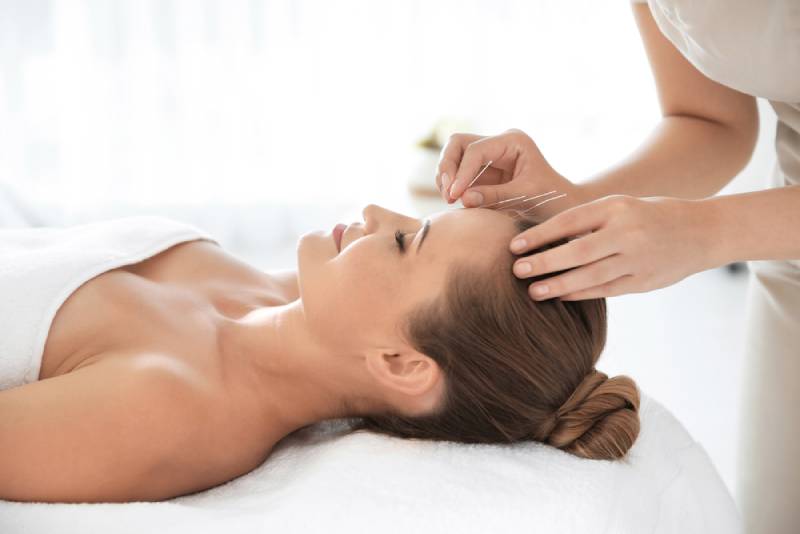
Well, when traditional acupuncture was first invented, it was believed to be a tool that aids in child conception by helping stimulate the hormones that increase fertility, or spiritually speaking, it was tied to the opening of chakra points and the flow of chi.
Regardless of whether you look at it from a mystical or medicinal standpoint, the results are the same, though modern researchers aren’t sure if it’s due to a placebo effect or if it actually works.
Some doctors shun the practice while some wholeheartedly recommend it as a means of helping deal with morning sickness, lower back pain that comes as a pregnancy side effect, or any other sort of pain.
This is mostly due to the attempt to reduce the amount of painkillers and other drugs during pregnancy in order to prevent as many potential complications as possible.
Nevertheless, a study conducted back in 2013 showed that well over 10%-11% of pregnant women in Europe had opted for the use of acupuncture to aid in their conceiving endeavors.
If you’re to take that as proof, it’s clear that it’s doing something right if it has such a presence.
But, before you go jumping on the bandwagon thinking it’s a miracle aid in helping deal with infertility, understand that it is no such thing.
Acupuncture is merely an aid in improving your chances ever so slightly and, while it has many other uses, do understand that it isn’t a blanket cure but only caters to specific conditions – such as alleviating pain in certain regions of the body, relieving stress and tension, and the like.
It sadly won’t be the cure for a terminal illness, as far as our current knowledge of traditional acupuncture spans.
So, as long as you educate yourself on what acupuncture can and cannot do, as well as the potential risks of using it, I’d say give it a shot, but don’t be disappointed if it doesn’t work out the way you hoped it would.
The Uses And Potential Benefits Of Acupuncture In Pregnancy
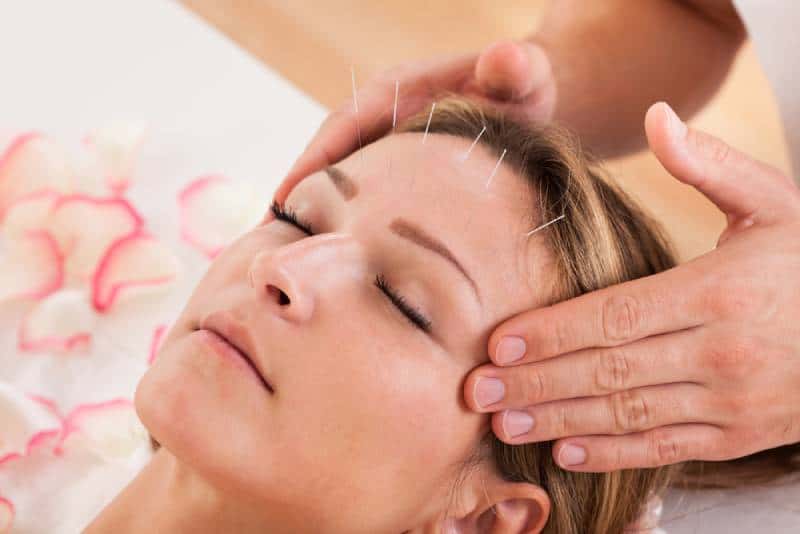
Now, while the practice on its own is amazing, it certainly doesn’t shy away from many benefits when practicing acupuncture pregnancy.
And they are plentiful, but they merely assist women during their pregnancies – a fact that I feel needs to be reasserted as it’s not the ultimate healthcare solution.
The best uses of acupuncture in pregnancy are reportedly:
- Reducing pain in the lower back
- Reducing constipation
- Alleviating labor pains
- Alleviating postpartum pain after a C-section delivery
- Reducing pregnancy-related panic and stress
- Dulling the effects of postpartum depression
- Alleviating any form of pain tied to pregnancy
- Helping fix a breech baby who ends up in a breech position due to an overabundance of amniotic fluid in the uterus
- Stimulating conception, regardless if natural or artificial via IVF or similar methods
- Treating sciatica pain
- Treating hemorrhoids and associated pain
- Helping deal with engorgement and breast tenderness
- Relieving headaches
- Alleviating pregnancy fatigue and lethargy
- Regulating vascular blood flow and reducing blood pressure
- Reducing the chances of heartburn
- Reducing pelvic discomfort, especially at the end of the second trimester and a good portion of the third trimester
As you can see, the potential aid of an acupuncture pregnancy can be quite beneficial, but it doesn’t cover everything, so make sure the issue you have is listed somewhere here.
If not, I suggest turning to a different source of help as there is no acu-point that will help in this case.
Side Effects And Risks Of Acupuncture During Pregnancy
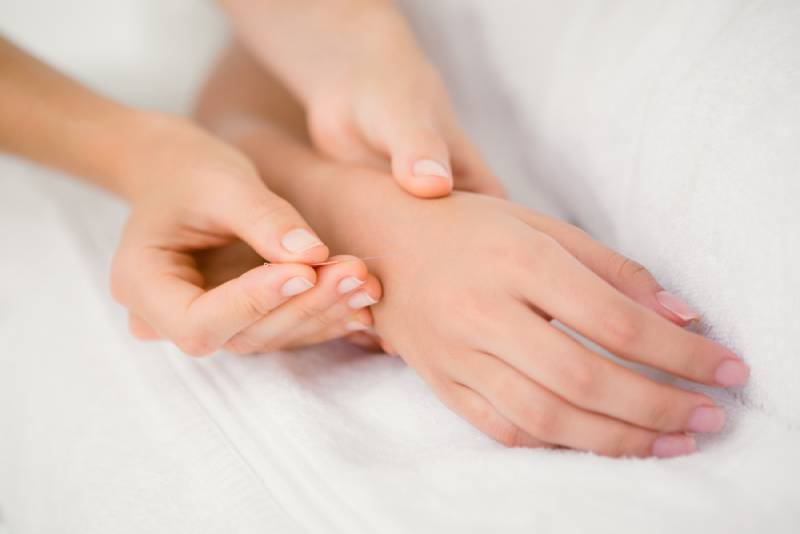
As many benefits as there are, it would be foolish of me to not also mention the added risks that come with receiving acupuncture while pregnant.
Risks that may cause potentially dangerous complications, depending on the specific acupuncture treatment and how your body reacts to the nerve stimulation.
A practitioner that performs acupuncture pregnancy near me informed me of all the dangers that are tied to acupuncture malpractice.
While they are few, they are very real threats to both your health and that of your unborn child.
Increased chances of premature labor and miscarriage
This issue is mainly tied with using acupuncture during the first trimester of pregnancy.
The aforementioned risk comes from a 2018 study where a group of women who had undergone an acupuncture pregnancy ended up having nearly double the rate of miscarriages as the control group did.
That said, it’s a study that wasn’t fully scientifically proven given the lack of data, but also because some believe that the causes may have been due to an improper application of the acupuncture treatment itself rather than a flaw in acupuncture as a practice.
They generally tie it to the stimulated release of the same type of hormones that cause pregnancy in the first place, which ends up triggering labor well before the due date and… well… I’d rather redact the rest.
This doesn’t mean that acupuncture is bad at every stage of pregnancy, just the first trimester, which is the riskiest time in a woman’s pregnancy anyway.
If you’re uncertain how far along you are, make sure to not miss your scheduled obstetrics and gynecology visits as well as your systematic reviews.
Your obstetrician will spot specific pregnancy symptoms to determine where you are at in your pregnancy, which will help you figure out a safe time to start using acupuncture for pain relief and its other benefits.
Risk of contracting an infection or a disease
As mentioned earlier, going to someone who isn’t a certified acupuncture specialist carries the risk of unsanitary practices.
This usually means an increased risk of coming into contact with needles that aren’t sterile, which brings with it a high chance of infection and disease, such as HIV, hepatitis, or STDs.
If the acupuncture practice isn’t following the necessary safety protocols, you definitely want to think twice before receiving any treatment there.
The use of incorrectly-sized needles
In the same vein as the disease and infection warning, practitioners that don’t adhere to the correct procedures are likely to also have needles that aren’t of the right size, ones that aren’t typically used in proper acupuncture practice.
Should you come across these imitation acupuncturists, turn away quickly to not suffer any adverse effects from improper application of the traditional practice.
EXTRA: Moxibustion As An Alternative To Acupuncture
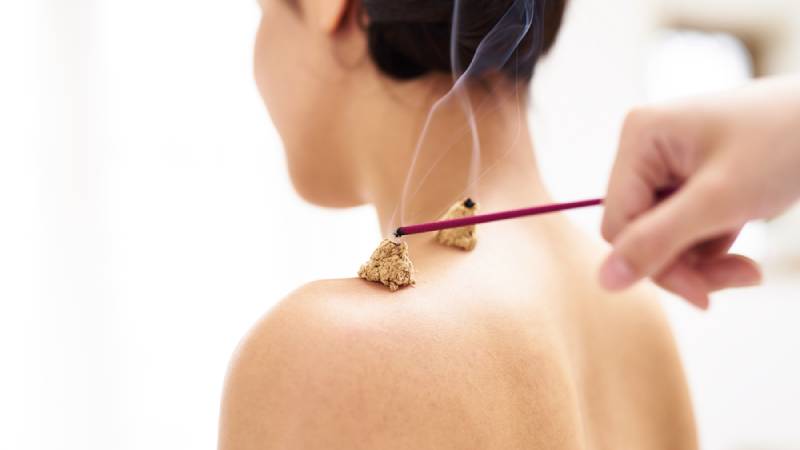
If you believe that the risks greatly outweigh the benefits of acupuncture, or you’re simply someone who is deathly afraid of needles, then you might want to give moxibustion a try.
Moxibustion is yet another form of alternative medicine derived from ancient China that uses dried plant material of Chinese mugwort called moxa and burns it near the skin, using the heat it radiates to help clear any chi blockages.
People believe that this works similarly to acupuncture without the need for needles and that it helps alleviate fatigue and illness.
The main downside is that it hasn’t been properly scientifically tested and from what little tests have been done, scientists believe that this treatment doesn’t really aid much, if at all.
The other downside is that if you’re someone who doesn’t like the smell of cannabis, you’re out of luck, because that’s the precise scent of Chinese mugwort when burned.
This also implies that it’s not really the best treatment for people with respiratory issues.
In Conclusion
While I am more of a believer in traditional medicine (the main reason I even became a midwife in the first place), I still believe that there are merits to some forms of alternative medicine such as receiving acupuncture during pregnancy.
If all the safety precautions are taken and you only begin acupuncture when you hit your second trimester, it can be a substantial aid in reducing the need for conventional drugs.
It helps train your body to defend itself rather than rely on an outside source, while also avoiding any potential side-effects from taking certain medications that your body may not be adjusted to.
Anything that helps in alleviating any discomfort during pregnancy is welcome in my book, and I wholeheartedly encourage any and all moms to try to find the best of both worlds of medicine.
That said, I still suggest first consulting your obstetrician or other healthcare professional before attempting any form of alternative medicine that may carry hidden risks.
As good as they may seem, they may have a side effect that could cause pregnancy complications. It’s better to be safe than sorry.
That said, I wish you all the best in your pregnancy – oh, and congrats on your upcoming bundle of joy! Stay safe, mamas!
References:
- Soliday, E., & Hapke, P. (2013). “Research on acupuncture in pregnancy and childbirth: the US contribution. Medical acupuncture”, 25(4), 252-260.
- Chen, H., Yang, M., & Lao, L. (2018). “Acupuncture for women undergoing in vitro fertilization”. JAMA, 320(13), 1385-1385.
Like this post? Please share or pin it for later. You can also stay in the loop and follow us on Facebook, Instagram or Pinterest.

This post contains affiliate links. Please see our full disclosure for more info.

